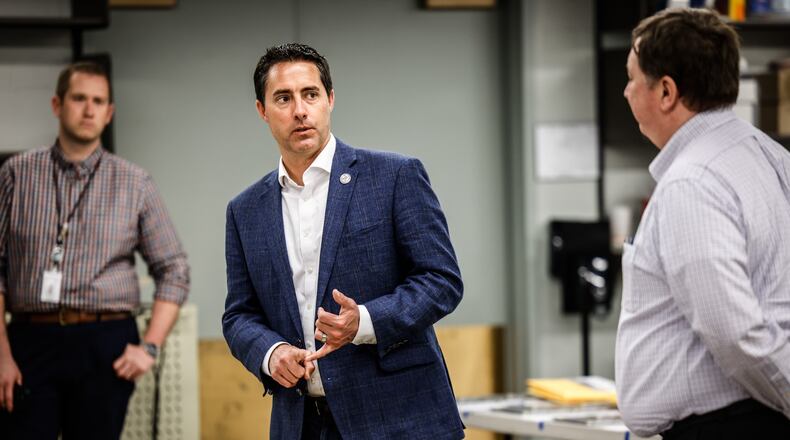“HB 54’s new proof-of-citizenship requirement imposes unnecessary obligations to register to vote in violation of the (National Voting Rights Act),” the plaintiffs argue. “HB 54 violates the U.S. Constitution because it is impermissibly vague, giving no guidance as to what constitutes sufficient proof of United States citizenship.”
The two groups filed their complaint in the Northern District of Ohio Eastern Division federal court last week, calling on the court to block enforcement of the proof-of-citizenship law. They are represented by the Elias Law Group, which is chaired by Democracy Docket founder Marc Elias.
Ohio Secretary of State Frank LaRose called the federal complaint an “activist lawsuit.”
“It’s common sense that only U.S. citizens should be on our voter rolls. I won’t apologize for, or back down from the work we do to ensure the integrity of our voter rolls,” LaRose said in a statement released by his office Monday. “We will win this case — just like we’ve fought off the other baseless actions that such groups have brought against us.”
HB 54 was the $11 billion biennial transportation appropriations bill signed into law by Ohio Gov. Mike DeWine in March. This legislation included funding for transportation infrastructure projects across the state, but it also included a provision that changed how adults can register to vote through the Ohio Bureau of Motor Vehicles.
The bill requires registrars and deputy registrars to offer voter registration to customers at Ohio BMV locations only if the customer presents proof of U.S. citizenship or has previously presented proof of U.S. citizenship, according to the bill’s analysis.
This provision was added months after the Dayton Daily News reported that three southwest Ohio county boards of election were finding that mistakes at the BMV resulted in noncitizens being registered to vote.
Leaders of election boards in Greene, Montgomery and Warren counties all told this news outlet that they have seen cases of noncitizens being mistakenly registered to vote, although those immigrants did not attempt to vote and were removed from the voter rolls.
BMV Registrar Charlie Norman has denied that there is a noncitizen voter registration problem at the BMV, saying that noncitizens don’t get the chance to register at the BMV because they don’t have the required proof of citizenship to get their driver’s license or state ID.
An Ohio BMV spokesperson did not respond to a request for comment this week about its voter registration policy.
Ohioans who are eligible to vote can also register to vote or update their voter registration online or by mail through the Ohio Secretary of State.
Ohio updated its voting law across the board in 2023 with HB 458. This bill requires all voters wanting to cast a ballot in-person to present an unexpired, state-issued photo ID card. But it also created a citizenship indicator for noncitizens who seek driver’s licenses or Ohio ID cards.
Voter fraud by American citizens or noncitizens in the U.S. is exceedingly rare. Ohio has more than 8 million registered voters.
Last fall, six people were indicted for allegedly voting in Ohio elections when they were not U.S. citizens, according to Ohio Attorney General Dave Yost. These cases were among 138 total allegations of people who improperly voted that his office is investigating at the request of LaRose.
Attorneys representing Red Wine & Blue and the Ohio Alliance for Retired Americans argued in their Aug. 22 complaint that the National Voter Registration Act requires that all applicants must attest, under penalty of perjury, that they are U.S. citizens.
And requesting “any ‘proof’ of citizenship beyond that attestation goes beyond the ‘minimum’ amount of information that is ‘necessary’ to determine an applicant’s eligibility,” the plaintiffs argue.
The two groups also state in their complaint that nearly 30% of Ohio voters register through the state BMV. They fear the change in procedure could create barriers for lawful residents.
Many women lack documents that reflect their current legal names after marriage or divorce. Older Ohioans may have lost or never obtained citizenship papers, which may be costly to replace. Additionally, college students often keep important records with family far from campus, the two groups argue in their federal complaint.
The law firm representing the Ohio plaintiffs has also worked with groups in other states to challenge voting rules. A Wyoming case was dismissed in federal court this summer.
About the Author

